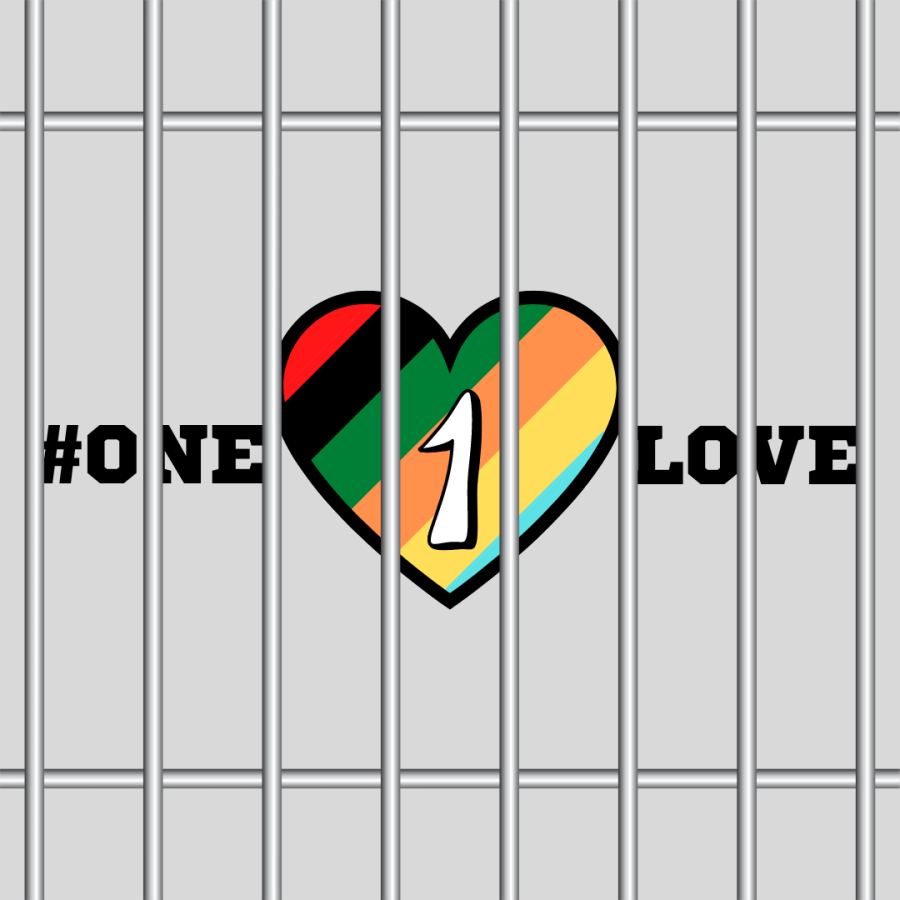FIFA and Qatar have worked to stop all forms of protest in wake of the numerous demonstrations staged during the World Cup by fans and teams alike.
Qatar security denied entry to fans who brought Iran’s pre-Revolution flag, donned pre-Revolution flag t-shirts or carried signs reading “Women, Life, Freedom” and “Mahsa Amini.” Spectators were forced to turn in these items or not enter the stadium, a policy most likely stemming from Qatar’s ties with Iran.
Qatar’s laws on homosexuality, with FIFA’s assistance, resulted in another banned item: the ‘OneLove’ armbands.
These armbands were a part of a campaign that opposes discrimination on the basis of race, skin color, sexual orientation, culture, faith, nationality, gender, age and all other forms of discrimination. Seven team captains planned to wear the armbands, but the idea was scrapped after FIFA threatened to issue yellow cards to any player wearing the band.
When questioned about the confiscated and banned items, a spokesperson referred to FIFA and Qatar’s list of prohibited items, including those with “political, offensive, or discriminatory messages.”
This statement did not answer any questions about prohibited items, but instead revealed FIFA’s hypocrisy. FIFA has taken action against fans and teams for “prohibited items” but remained silent on Qatar’s controversy.
Criticism about Qatar’s selection as the FIFA World Cup host has persisted since the decision was made in 2010. Logistically, holding a soccer tournament in a country where temperatures regularly top 100 degrees Fahrenheit made no sense. Morally, the allegations of bribery, corruption and concerns about human rights violations surrounding Qatar reflect poorly on both the country and FIFA.
Senior Libby Kamp, a soccer player and longtime fan of the World Cup, has noticed FIFA’s hypocrisy. “They [FIFA] have avoided talking about Qatar’s multiple violations of human rights, especially in regard to women, LGBTQ+ individuals and migrants,” she said.
Kamp is referring to the thousands of migrant workers who died while constructing the tournament’s stadiums. A 2021 investigation found that more than 6,500 migrant workers died in Qatar from related causes: workplace accidents, car crashes, suicide and heat, though Qatar and FIFA deny these accusations. Qatar claims only three people died as a result of work on World Cup construction sites, acknowledging 37 additional deaths from non-work related incidents.
Beyond the World Cup, Qatar is known for their zero-tolerance laws against sex outside of marriage and criminalization of same-sex relationships. These policies have resulted in the prosecution of rape victims, seven years prison sentences for gay men, and three years imprisonment for “acts of sodomy and immorality.”
Qatar has not tried to hide their intolerant beliefs from FIFA and the world.
Two weeks before the start of the tournament, during a German interview, a Qatari ambassador for the World Cup described same-sex relationships as “damage in the mind.” He continued with sentiments about homosexuality being haram and that he has issues with children seeing gay people.
Numerous LGBT+ groups and organizations have expressed concern about the country’s criminalization of same-sex relationships and the safety of LGBT+ tourists attending the World Cup, but FIFA has yet to release a statement.
“The fact that players were in danger of being carded for wearing the armbands is terrible, and it was FIFA who threatened them,” Kamp continued. “It’s very showing of FIFA’s true colors.”
FIFA also has not addressed Iranian fans’ protest against their government. More than 18,000 people, 555 of whom are students, have been arrested in Iran since Mahsa Amini’s death. Protests sparked, resulting in the Iranian government killing at least 402 protesters.
FIFA’s silence speaks volumes.
As an international organization whose mission is to globalize, popularize and democratize soccer, this World Cup has exposed the flaws in their mission. Whether it be through corruption, bribery or lack of care for human rights, FIFA allows external forces to influence their actions.
What will it take for FIFA to care more about humanity than politics?









